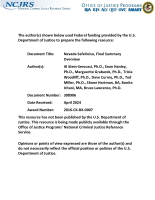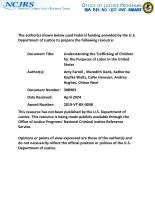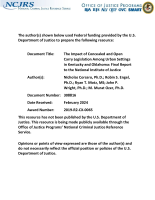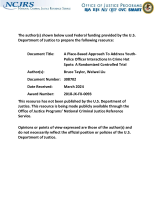Law enforcement
Understanding the Trafficking of Children for the Purposes of Labor in the United States
The Daunting Task of Strengthening Medical Examiner and Coroner Investigations Across Hundreds of Jurisdictions
The Effect of Occupational Status on Health: Putting the Social in Socioeconomic Status
A Higher Bar: Institutional Impediments to Hate Crime Prosecution
Offering Recovery Rather Than Punishment: Implementation of a Law Enforcement-led Pre-arrest Diversion-to-treatment Program for Adults with Substance Use Disorders
Community Perceptions of Contributors and Solutions Related to Neighborhood Violent Crime: A Qualitative Interview Study
Webinar Transcript: Fiscal Year 2024 Evaluating Strategies to Advance the Implementation of Evidence-Based Policies and Practices Solicitation
This webinar provided an overview of the NIJ FY 2024 Evaluating Strategies to Advance the Implementation of Evidence-Based Policies and Practices solicitation, in which...
Characterizing and Preventing Domestic Terrorism: A Mixed-Methods Study of Five Far-Right Terrorist Groups
Determining the Age-At-Death of Infants, Children, and Teens
Utilizing Science-based Practices to Enhance Police Recruiting and Hiring
Overcoming Recruiting Shortages by Applying Industrial and Organizational Psychology Practices
Webinar Transcript: NIJ FY 2024 Research and Evaluation on School Safety
This webinar provided information on the NIJ FY 2024 Research and Evaluation on School Safety solicitation. In collaboration with BJA, this solicitation will seek applications for rigorous research and evaluation projects to fill knowledge gaps in two topical areas:
- Studies on the root causes and consequences of school...
Staggered Deployment of Gunshot Detection Technology in Chicago, IL: A Matched Quasi-experiment of Gun Violence Outcomes
Improving Collaboration Between Departments of Labor and Other Members of the Anti-Labor Trafficking Community
Adolescent Child Custody Loss and Substance Use Treatment as Predictors of Young Adult Substance use Trajectories Among Females with Foster Care and Juvenile Justice Involvement
Understanding What Works in the Identification, Investigation, and Prosecution of Labor Trafficking Cases in the United States: Improving Collaboration Between Law Enforcement Agencies and Departments of Labor Key Findings and Recommendations
Law Enforcement Officers Safety and Wellness: A Multi-Level Study (2024)
Neighborhood Crime Survey: An Examination of the Relationship between Immigration and Victimization
The Impact of Concealed and Open Carry Legislation Among Urban Settings in Kentucky and Oklahoma: Final Report to the National Institute of Justice
Webinar Transcript: NIJ FY 24 Research and Evaluation on the Impact of Technologies for Forensic Science Applications
This webinar provided information about the "FY 24 Research and Evaluation on the Impact of Technologies for Forensic Science Applications" solicitation. NIJ seeks applications for funding for proposals to study how adopted technologies with a forensic science application impact criminal justice systems, how the implementation of forensic laboratory...






